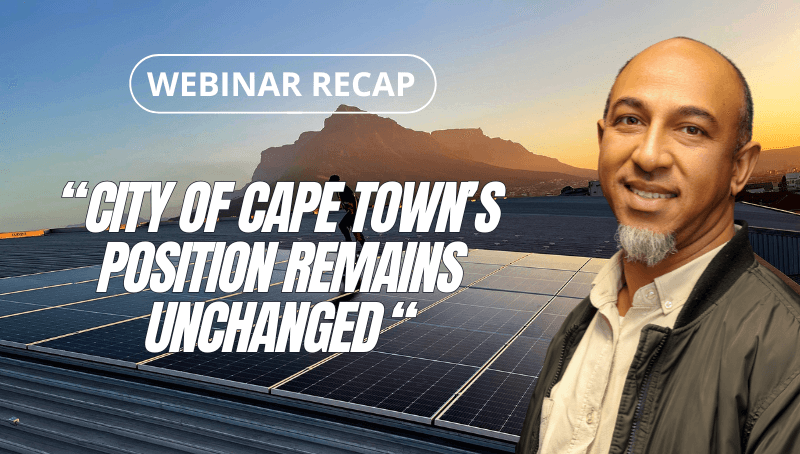What Cape Town decided on SSEG sign-off
Recap of our webinar on SSEG and compliance in practice


In our Alumni webinar on 30 October 2025, we turned the spotlight on the City of Cape Town, whose online SSEG process has become a model for national replication.
And then came an uncanny coincidence: just days before the session, Eskom announced it would no longer require a Pr. Eng. to sign off residential PV systems. The announcement reignited the very debate at the heart of our earlier webinar, Who can issue the CoC?, and set the stage for a closely watched conversation about whether Cape Town would follow suit.
Quick summary:
- Cape Town will keep the Pr. Eng./Pr. Tech. sign-off requirement despite Eskom’s change.
- The City says safety and liability outweigh cost until SANS 10142-1 is updated.
- Installers report the online SSEG portal is practical and workable.
- Accurate system data prevents grid instability like cold-load pickup.
- The industry still needs clarity on solar-specific competence for sign-offs.
A clear, steady answer
When Ismail Jefferies, Head of Service Connection Planning for the City, joined the panel, he didn’t hesitate. Cape Town’s position remains unchanged. Until the SANS 10142-1 wiring code properly covers the integration and synchronisation of PV systems with the grid, a registered professional will continue to sign off SSEG systems.
In his words, “the costing factor cannot override the safety factor.” The City’s view is simple: the technical and legal responsibility of that signature matters more than saving a few rand.
When “not satisfied” means “ask better”
But that answer didn’t entirely satisfy moderator Antje Klauss-Vorreiter. She asked what everyone else was thinking: if Cape Town can hold this line while others call it unaffordable, how does it actually work in practice?
Junior Le Grange, GREEN trainer and electrician, picked up that thread and described the process from an installer’s point of view, outlining how the City’s online SSEG portal now replaces the old paper-heavy process with a clear, trackable workflow.
He explained each step, from e-Services registration and permission to install, through COC upload and commissioning, and noted that the system is not only functional but genuinely workable for both installers and homeowners.
Beyond Paperwork: Protecting the Network
The conversation moved beyond forms and signatures. Jefferies explained that accurate data on each PV installation allows the City to model and manage its grid properly: knowing the number of panels, inverters, and batteries helps prevent overloading.
He described how, during high stages of load shedding in 2023, unregistered or incorrectly configured systems caused cold load pick-up when all the batteries in a suburb began charging at once, tripping feeders and keeping areas without power for hours. Having the right data helps prevent those scenarios and ensures that liability is clear when a system fault affects the network.
Responsibility of living up to qualifications
When it was time to involve the audience, Stefan Ortmann, a GREEN alumni and owner of Treetops Renewable Energy Systems posed a question that hit everyone’s nerve: “Why does City of Cape Town see a non-solar-trained Pr. Eng. as sufficient to sign off, while solar-trained Installation Electricians or Master Installation Electricians are not?”
Ismail Jefferies responded that, just as electricians are expected to upskill, engineers too must ensure they have relevant solar PV training before signing off systems. The City doesn’t vet engineers for solar-specific experience, but it assumes professional integrity: that anyone signing off understands both the technical and legal responsibility that comes with their ECSA registration.
Junior Le Grange agreed with Stefan’s frustration, saying that an ECSA title alone doesn’t automatically make someone competent in solar. He suggested an additional layer of verification – some form of PV-specific competency recognition for those doing sign-offs – to balance technical experience with formal accountability.
What’s next?
The session closed with a forward look at how the City is preparing for a smarter, more dynamic grid. Jefferies described a near future where every approved inverter communicates with the utility, allowing two-way data flow between the City and customers.
With more than 375 MW of PV already connected, Cape Town’s next step is to use that information to manage exports, stabilise supply, and enable customers to become active participants and not just consumers in the network.
Bringing everyone to the table
GREEN plans to keep the conversation going. One final Compliance in Practice webinar is on the horizon before year-end that aims to bring the ECA and Eskom perspectives into the same virtual room, to build a shared understanding of what compliance should look like nationally, and how clear, consistent rules can support both safety and market growth.
Watch the full discussion below:
The session sparked great discussions about how to apply compliance knowledge in real-world projects, and that’s exactly what our in-depth courses are designed for. If you’d like to take the next step, book your seat on one of these advanced courses:

